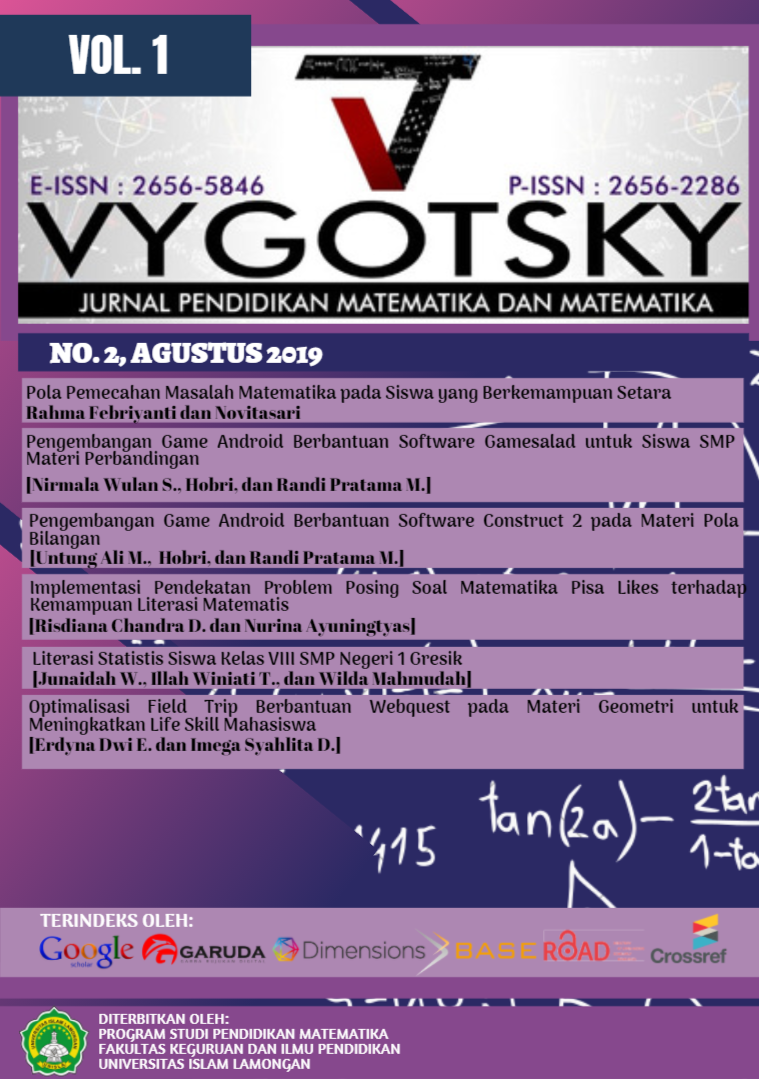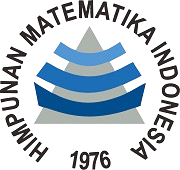Implementasi Pendekatan Problem Posing Soal Matematika Pisa Likes Terhadap Kemampuan Literasi Matematis
DOI:
https://doi.org/10.30736/vj.v1i2.136Abstract
Pendekatan problem posing (PPS) sejalan dengan tujuan kurikulum pendidikan matematika di Indonesia, yang memberikan bekal kepada siswa untuk berpikir logis, kritis, cermat, kreatif dan disiplin serta mengetahui kegunaan matematika dalam kehidupan nyata. Penelitian ini menuntut mahasiswa calon guru matematika untuk mengajukan soal matematika PISA likes guna memperkaya wawasan tentang literasi matematis. Tujuan dari penelitian ini untuk mengetahui dan mendeskripsikan aktifitas guru, aktivitas mahasiswa, hasil belajar mahasiswa dan respon mahasiswa. Metode kuantitatif digunakan dalam penelitian ini dengan sampel penelitian sebanyak 31 mahasiswa jurusan pendidikan matematika STKIP PGRI Sidoarjo semester 6. Hasil dari penelitian ini yaitu pendekatan Problem Posing PISA Likes memberikan kontribusi terhadap kemampuan literasi matematis bagi mahasiswa calon guru.Downloads
References
Barlow, A. T., & Cates, J. M. (2006). The impacts of problem posing on elementary teachers’ belief about mathematics and mathematics teaching. School Science and Mathematics, 106, 64-73. http://dx.doi.org/10.1111/j.1949-8594.2006.tb18136.x
English, Lyn D. (1997). “Promoting A Problem Posing Classroomâ€. Teaching Children Mathematics, November 1997. p.172-179.
Lavy, I., & Bershadsky, I. (2003). Problem posing via “what if not?†strategy in solid geometry-a case study. Journal of Mathematical Behavior, 22, 369-387. http://dx.doi.org/10.1016/j.jmathb.2003.09.007
Misbahuddin dan I. Hasan. (2013). Analisis Data Penelitian Dengan Statistik. Jakarta : Bumi Aksara.
OECD. (2013). PISA 2012 Assessment and Analytical Framework: Mathematics,Reading, Science, Problem Solving and Financial Literacy. Paris: OECD Publishing.
OECD. (2014). PISA 2012 Result in Focus: What 15-year-olds know and what they cando with what they know.http://www.oecd.org/pisa/keyfindings/pisa-2012-resultsoverview.pdf. diakses tanggal 15 September 2014 pukul 15.32.
OECD. (2014). PISA 2012 Results: What Students Know and Can Do StudentPerformance in Mathematics, Reading and Science. Volume I. Paris: OECDPublishing.
Setiawan, dkk. (2014). Soal Matematika Dalam Pisa Kaitannya Dengan Literasi Matematik Dan Keterampilan Berpikir Tingkat Tinggi. Jember : Program Studi Pendidikan Matematika FKIP Universitas Jember
Silver, Edward A & Cai, Jinfa (1996).â€An Analysis of Arithmetic Problem Posing By Middle School Studentsâ€. Journal For Research In Mathematics Education,Volume 27. No. 5, p. 521-539
Siregar, S. (2012). Statistik Parametrik untuk Penelitian Kuantitatif. Jakarta : PT. Bumi Aksara.
Siswono, T. Y. E. (2018). Pembelajaran Matematika Berbasis Pemecahan dan Pengajuan Masalah. Bandung : Rosda.
Within, D. J. (2006). Problem posing in the elementary classroom. Teaching Children Mathematics, 13(1), 14-18.
Downloads
Published
How to Cite
Issue
Section
License
Copyright:
Authors who publish their manuscripts in this Journal agree to the following conditions:
- Copyright of any article on Vygotsky: Jurnal Pendidikan Matematika dan Matematika is held solely by the author under the Creative Commons Attribution 4.0 International license (CC BY NC SA).
- Authors can submit papers separately, arrange non-exclusive distribution of manuscripts that have been published in this journal into other versions (e.g. sending to the author's institutional repository, publication in a book, etc.) by acknowledging that the manuscript has been published for the first time in Vygotsky: Jurnal Pendidikan Matematika dan Matematika.
License:
Vygotsky: Jurnal Pendidikan Matematika dan Matematika is published under the terms of the Creative Commons Attribution 4.0 International License (CC BY NC SA). This license permits anyone to copy and redistribute this material in any form or format, compile, modify and develop this material for any purpose as long as it is not for commercial purposes. Additionally, anyone must provide credit and distribute contributions under the license of the creator of the original work.







